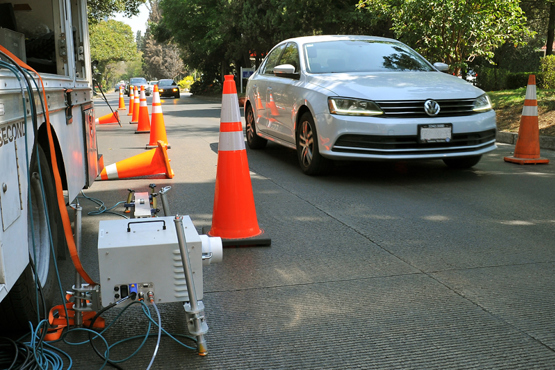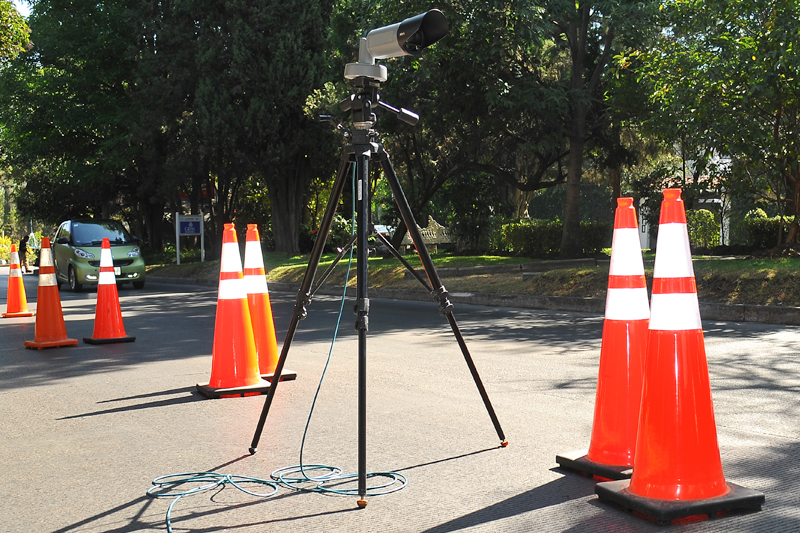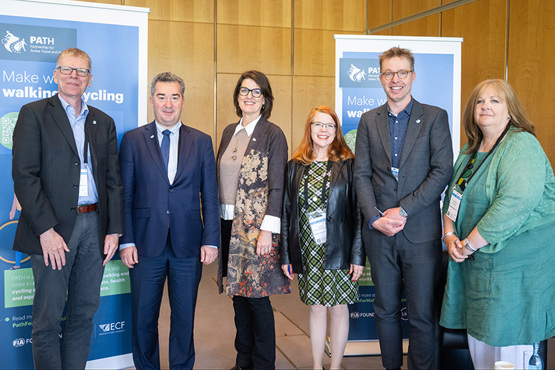TRUE remote sensing campaign begins in Mexico City

A TRUE study of real-world emissions has begun in Mexico City, marking the first TRUE Latin America remote sensing campaign. The testing and analysis, led by the ICCT and supported by FIA Foundation, is being performed in collaboration with Mexico City Secretaría del Medio Ambiente (SEDEMA). Remote sensing measurements of exhaust emissions will be collected at several locations across the metropolitan area. These data will provide detailed insight into in-use emissions of the Mexico City fleet and help inform policies to improve air quality and reduce health impacts.
The TRUE study builds on a long history of remote sensing in Mexico City. As early as 1991, remote sensing studies examined the emissions performance of vehicles in Mexico City, including an analysis of the impact of an update to light-duty vehicle emission standards. Remote sensing studies have also evaluated specific emission reduction policies, such as the effectiveness of Mexico City’s vehicle verification program. Most recently, the Megalopolis Environmental Commission (CAMe) is building on work identifying high-emitting diesel vehicles for maintenance through the Pro-Clean Vehicles Campaign, initiated in 2021. The growth of remote sensing databases allows for more complete examinations of trends of vehicle emissions over time and improved emissions inventory modeling for quantifying the impact of vehicle emissions on air quality.
The upcoming TRUE analysis will help further develop understanding of the impact of excess vehicle emissions on air quality through the collection of new data. In addition to measuring CO2, CO, HC, NO, and particulate matter as done in past studies in Mexico City, the TRUE remote sensing campaign will also measure NO2 tailpipe emissions and evaporative emissions. Evaporative emissions are a contributor to high ozone levels, and previous analysis (español) of remote sensing data conducted by Eastern Research Group (ERG) has shown high rates of HC deterioration for some segments of the Mexico City fleet, indicating excess evaporative emissions.

Data collected from the study will be used to analyze emissions by various vehicle categories such as heavy-duty vehicles, taxis, and passenger cars. Additionally, within the light-duty passenger car fleet, emissions will be analyzed by vehicle age, emissions standard, and manufacturer.
The vehicle emissions data collected in this project is part of the expansion of TRUE’s global work. The development of a Latin America database will support evaluations of more region-specific vehicle emission trends. Combined with planned remote sensing projects in other Latin American cities, this project will help cities utilize real-world emissions data to develop effective policies, similar to TRUE’s work across European cities analyzing the impact of low emission zones.
Data collected from the study can help evaluate existing policies and provide guidance for policy goals related to emissions testing and vehicle restrictions. Additionally, the data collected during the TRUE remote sensing study will inform discussions of new national tailpipe emissions standards for light-duty vehicles, which were last updated almost 20 years ago. Within Mexico City, the Hoy No Circula program, first implemented in 1989, currently restricts vehicle operation and requires bi-annual emissions inspections for older, higher-emitting vehicles. Vehicles are subject to different inspection requirements based on vehicle type and age. Emission reductions associated with potential future changes to these categorizations can be analyzed using remote sensing data. The impact of a low emission zone, which is currently being discussed by policymakers, can be more accurately modeled using updated emission factors by vehicle age and emission standard. Remote sensing data can also support the development of policies to target specific segments of the vehicle fleet, such as trucks. Diesel trucks are a major contributor to air pollution and updating truck access restrictions based on real-world emissions data can help reduce air pollution.
The TRUE Mexico City Remote Sensing project is a continuation of TRUE’s technical support to cities to help them improve air quality and health. This analysis will emphasize the importance of targeting the highest emitting vehicles and shifting to cleaner, more sustainable transport.



